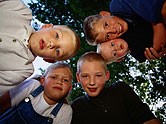 “It’s the kind of play we all remember from childhood — climbing trees, riding your bike fast, roaming the neighborhood with no direct adult supervision,” explained lead researcher Mariana Brussoni, an assistant professor at the University of British Columbia’s School of Population & Public Health, in Vancouver, Canada.
“It’s the kind of play we all remember from childhood — climbing trees, riding your bike fast, roaming the neighborhood with no direct adult supervision,” explained lead researcher Mariana Brussoni, an assistant professor at the University of British Columbia’s School of Population & Public Health, in Vancouver, Canada.
Her team’s review, published online in the International Journal of Environmental Research and Public Health, included 21 previously published articles with about 50,000 kids from eight countries looking at different types of “risky” play. Children in those studies ranged from ages 7 to 15.
They found that when kids were allowed to play in ways that involved some sense of “risk” — such as climbing trees or exploring their neighborhood — it seemed to benefit their development.
When there is no adult in charge, she explained, “children learn how to negotiate with each other, how to get along, and how to make their own rules.” Even “rough-and-tumble” activities, like wrestling or play-fighting, may help kids learn to get along, the review found. At the very least, they do not seem to turn children into bullies. “Rough-housing is different from fighting or bullying,” she said. “It’s not about one child trying to dominate another. There’s negotiation going on. You adjust your behavior and strength to the other child’s.”
Overall, the review found that such free play did not put kids in any particular danger. One study found that the risk of injuries requiring medical attention was lower during kids’ free-play hours, compared with sports.
“There’s a lot of good research showing the value of ‘uninterrupted play,’ ” said Rebecca Berry, a child psychiatrist from the Child Study Center at NYU Langone Medical Center, who was not involved in the research.
“Uninterrupted” means that parents let their child get dirty, climb equipment in the playground, or get themselves out of a minor scrape — without immediately trying to intervene.
Kids need activities that are not led by an adult to truly learn, according to Berry. “Peer-group play is so important,” she said. “That’s how kids learn to take turns and figure out they can’t always go first. They learn to handle their emotions and deal with disappointment.”
Of course, parents should make sure their kids are in a safe environment, both Berry and Brussoni said. If parents live in an urban neighborhood, or a suburban one without sidewalks or with heavy traffic, they might not be able to let their kids roam. But parents could relax a bit when they take their kids to the park, for example.
Sometimes children just need some breaks from taking instruction. “Don’t we, as adults, need some time during the day where nobody is telling us what to do?” Brussoni asked. “Why would kids be any different?”
